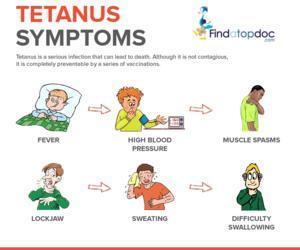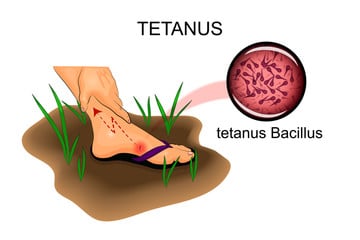
Tetanus is a bacterial infection caused by Clostridium tetani. This bacterium is found throughout the environment, but is especially prevalent in soil and animal feces. It can enter the body through a wound, where it can grow and release a toxin, called tetanospasmin. The tetanospasmin is a neurotoxin that affects nerves and can cause life-threatening muscle spasms, cramps, and seizures. If this toxin is inhaled, the victim can experience difficulty breathing.
In case of tetanus, the incubation period varies from one to 55 days. A short incubation period increases the risk of fatality. The incubation period, or the time after infection, is the time between inoculation and first symptoms. The shorter the incubation period, the higher the risk of death. In some cases, the patient will need to undergo surgical procedures to remove dead tissue and the infected material. Some patients may need to undergo ventilator support and require a breathing tube.
Treatment for tetanus depends on the severity of symptoms. The symptoms can range from mild to severe, and doctors may prescribe antibiotics to fight the bacteria and prevent them from multiplying and producing neurotoxin. This neurotoxin causes muscle spasms and stiffness. In some cases, patients may need to receive a breathing tube or a ventilator to breathe properly. The infection can also be treated with a tetanus vaccine.
Symptoms of tetanus are similar to those of a cold, except the incubation period is three to twenty-one days. Most people develop symptoms after exposure, and a doctor will prescribe an appropriate treatment. Although the condition is not contagious, tetanus is still contagious. While it is not contagious, it is still important to seek medical treatment right away.
Since tetanus is a bacterial infection, it is important to get a tetanus shot. Fortunately, there are vaccines for tetanus, and a doctor’s diagnosis will depend on the symptoms. While tetanus is not a common condition, it is a serious condition that requires immediate medical attention. This could be fatal.

Despite the danger associated with tetanus, it is relatively rare in the United States. However, in countries where immunization is not mandatory, tetanus is more common. The bacterium Clostridium tetani causes tetanus. Bacterial spores are found in dust, dirt, and animal droppings and can enter the body through cuts.
A tetanus shot will provide protection against the bacteria that causes the disease. This is not a cure for tetanus, but tetanus toxin can be life-threatening if you don’t get vaccinated. Fortunately, tetanus is a disease that is not as serious as the flu. You may have a tetanus shot, but if not, you should see your doctor. Read detailed information about the disease tetanus on the website https://igs.org.mx/.
During a tetanus infection, the body’s immune system will attack the bacteria that cause it. A tetanus patient’s condition may result in a weakened or paralyzed body. Once infected, tetanus is often fatal, and if you have a positive diagnosis, your physician will immediately seek the appropriate treatment. This will ensure that your child remains safe.
Once the toxin has entered the body, it affects the nerves that control muscles. The infection can lead to stiff muscles and severe breathing problems. It can also be accompanied by a fever and a high blood pressure. Symptoms of tetanus can range from severe muscle spasms to a weakened heart. Many of the symptoms of tetanus are related to a different condition.
People who have been exposed to tetanus bacteria should seek medical attention if they think they have been bitten by an animal. While tetanus is very rare in the U.S., approximately ten percent of the cases are fatal. Vaccination is the best way to protect yourself from this infection. It is important to ensure that you receive tetanus vaccination.
The tetanus toxin can cause brain swelling. It is important to get a tetanus vaccine to prevent the infection in your body. Getting a tetanus vaccination will also help prevent the disease from coming back from a wound. The tetanus vaccine is part of the NHS childhood vaccination program. It will protect you from tetanus toxin and its harmful effects.